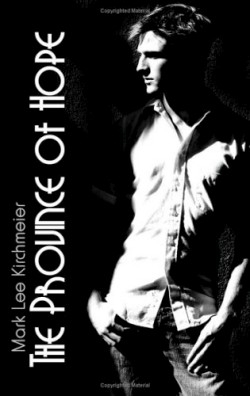The Province of Hope
Johnny Verliebt epitomizes the lost boy. Mildly antisocial perpetually detached from those around him attracted to men the central character in Mark Lee Kirchmeier’s three-part short novel is first described sitting in a tree house—the perfect viewpoint metaphorically and literally to observe the world at a distance.
The Province of Hope doesn’t keep Johnny estranged for long. Good-looking and athletic he does have friends here and there. One a young woman named Ann introduces Johnny to her boyfriend Robert. Over the course of the first two parts of the novel Johnny and Robert’s relationship forms the heart of the story and it’s one that many gay men can relate to: the slightly older man offering the slightly younger man not just sex (however important that may seem to the younger man) but mentorship a roadmap to maturity. Despite Robert’s affection for Johnny however and despite his attempts to integrate the idea of another man sharing his life Robert is ultimately unable to accept himself as openly gay.
Kirchmeier only needs a few words to convey the mental and emotional complexities of his characters. Even when the novel transports characters across great distances—such as when Johnny suddenly abandons his home in Texas to surprise Robert in Boston—the author varnishes the action with a patina of believability. We see those Boston streets; we see the brownstone where Robert a physician has come to live. In the third and the most poignant part of the novel we see the home and the life that Johnny has forged for himself without the sexually opportunistic Robert.
The author’s sense of literary economy is particularly useful when it comes to describing the social conditions during the timeframe of the book 1981 to 1988. When a variety of flamboyant personalities and the specter of AIDs are introduced late in the book the risk of stereotyping arises. Yet these secondary characters have intense inner lives and the plot points revolving around them never seem tragic or inevitable. There’s a sense of celebration in fact particularly as Johnny’s evolution into a secure (if still mildly antisocial) man completes itself.
Indeed things do come full circle: Johnny meets a troubled young man with great potential. Now Johnny who has endured so much emotionally can repay the debt he feels he owes to Robert. Fortunately Johnny is far more at peace with himself than Robert could ever be. This not-so-slight difference means that The Province of Hope is really a dream fulfilled.
Reviewed by
Leonard Jacobs
Disclosure: This article is not an endorsement, but a review. The publisher of this book provided free copies of the book and paid a small fee to have their book reviewed by a professional reviewer. Foreword Reviews and Clarion Reviews make no guarantee that the publisher will receive a positive review. Foreword Magazine, Inc. is disclosing this in accordance with the Federal Trade Commission’s 16 CFR, Part 255.

